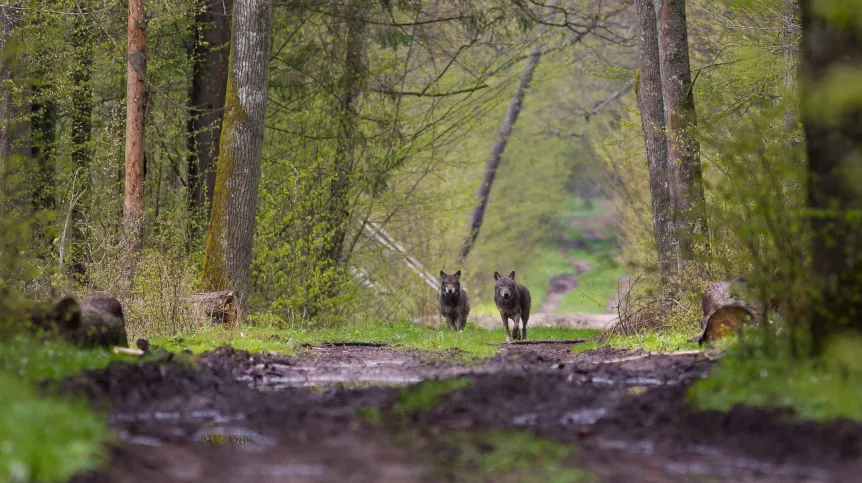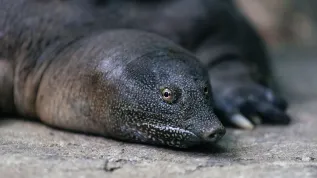
Wolf culling does more harm than good; all scientific studies confirm this, says Sabina Pierużek-Nowak, PhD, a professor at the University of Warsaw. For example, when a parental pair is killed, the young individuals, left without care, start hunting farm animals.
At the beginning of March, the European Commission, in line with its earlier announcement, proposed easing the protection of wolves in Europe. In the annexes of the Habitats Directive, its status will change from 'strictly protected' (Annex IV) to 'protected" 'Annex V). This change will allow EU countries to cull wolves, although the countries will still have to take the size of their population into account. The EC proposal will still have to be accepted by the European Parliament and the Council of the European Union, which is composed of representatives of the governments of the EU member states.
At the end of March, experts from the State Council for Nature Conservation requested the Polish government not to support the European Commission's actions leading to lowering the protection status of wolves.
In the meantime, the decision to return to wolf hunting was made in Spain, when the local parliament removed wolves from the list of protected species, allowing (after a three-and-a-half-year ban) the shooting of these animals north of the Duero River.
'Wolves living in Spain, north of the Duero, were never included in Annex IV of the directive, but in V. Their culling was not being done over the last few years, but it has returned. I am convinced that in many EU countries, especially in Germany and Austria, whose MEPs have been actively pursuing these changes to the Habitats Directive, as soon as wolves are formally transferred from Annex IV to V, i.e. their status in these countries changes from 'strictly protected' to 'protected', hunting will begin', says Sabina Pierużek-Nowak, PhD, a professor at the University of Warsaw, who has been conducting research on wolves for 30 years.
She reminds that there are countries in the European Union where the wolf is not a protected species and where it has been culled for years. 'These include all the Baltic countries: Lithuania, Latvia and Estonia, but also Slovakia. Several hundred wolves are killed there every year, while in Lithuania - several dozen. According to these countries, this is appropriate management of the population of these animals, but all scientific studies clearly show that culling does more harm than good', she emphasises.
Firstly, hunting wolves (especially adult wolves, which form a parental pair in a given group) leads to a decrease in the average age of a given population, disruption of its social and territorial structure, and early dispersion (i.e. leaving the group) of very young individuals. This, in turn, leaves the group without mature, experienced individuals. 'And it is these oldest ones who are the carriers and transmitters of knowledge about the environment - where to look for food within the territory, how to hunt animals living in a given area, what hunting spots and techniques to use, how to defend their territories from intruders and neighbouring groups. When they are missing, young wolves are left to their own devices', Sabina Pierużek-Nowak explains.
It is not just about the transfer of knowledge. 'Young individuals, deprived of parental care, begin to behave +irresponsibly+. They have not yet acquired the ability to effectively hunt wild ungulates, and if no one provides them with food - they have to take care of themselves somehow. If during the hunting season, i.e. in autumn and winter, the parent pair is shot, then several-month-old puppies are forced to obtain food on their own, hunting for easier prey, e.g. farm animals. They also begin to appear near houses, feed on compost heaps, kill dogs. Such effects of shooting have been shown, among others, by studies conducted in Latvia and Slovakia. Therefore, the more wolves are hunted, the greater the amount of damage to livestock caused by young individuals later on', the biologist points out.
As a result of hunting, the ecosystem services provided by wolves are also reduced. 'Wolves play an important ecological role, which means that this species affects the healthy functioning of the entire ecosystem. By hunting wild ungulates, wolves reduce their population size, which in turn affects, among other things, the protection of the forest from excessive browsing of young tree trunks by deer, or the protection of agricultural fields where these herbivores feed', the scientist explains.
'The wolf is our native species, it has lived in forests in the current territory of Poland for thousands of years. It disappeared from part of the country in the 1970s after a twenty-year period of extermination, and then its numbers were severely limited as a result of excessive culling. I do not understand why people are so surprised and reluctant when they meet this predator, and speak so sympathetically about bears', she says.
In her opinion, the reason may be 'deliberate perpetuation of the fear of wolves that has been present in us since childhood, spreading prejudice and false information by groups interested in returning to wolf hunting'.
'Recently, along with the actions of the EC concerning the lowering of the protection status of wolves, there is again a lot of information - on the Internet, in local and national media - about allegedly dangerous situations or even wolf attacks on people. After a more thorough check, it turns out that the accounts of people who supposedly experienced this are either unreliable or the result of an incorrect interpretation of the behaviour of wolves, or even fear (and as we know +fear has big eyes+), so in reality these situations did not pose any threat to humans', Pierużek-Nowak points out.
'By the way, in Poland we have almost 8 million dogs, of which several hundred thousand - despite having owners - wander unsupervised among buildings, fields and forests. Such dogs form groups of a few to a dozen or so individuals and are able to hunt not only farm animals, but also wild ones. And what is even more alarming, dogs are the perpetrators of at least 5 thousand cases of biting people per year, of which almost 4 thousand are serious, several hundred end in hospitalisation, and a few in death. Why are such commonly wandering dogs not treated as a serious threat to human health and life - instead, after every sighting of a wolf in a field or near buildings, alarming warnings appear on municipal websites, and then they are thoughtlessly repeated in the media? Such unreliable media information fuels a spiral of fear and aversion to wolves, and provokes or increases acceptance of illegal activities, in line with the intention of the instigators of the campaign against these predators', she says.
The scientist reminds that wolves perceive the surrounding world through smell and hearing, not sight, which is weak in their case compared to humans. 'From a distance of 100 or even 50 meters, wolves do not recognize us at all, unless they smell us with their noses, but only when the wind is blowing from us towards them. Therefore, if a wolf looks in our direction and does not run away immediately, it is not a sign of impudence or even aggression, but shortsightedness. Dogs have a similar problem. In such a case, it is enough to wave your arms wide and shout sharply, and the wolf will recognize that it is dealing with a human and go away', she adds.
'It must be clearly stated that the wolf is not a terrible beast, but a natural and important part of our nature. Wolves also provide many ecosystem services to our economy, for example by reducing the density of wild ungulates in forests and fields, which reduces damage to forestry and agriculture. Of course, they also pose a threat to farm animals, but there are effective methods to minimise this threat, and the state should support farmers in this, using available EU funds, among others thing', the scientist concludes.
Two weeks ago, the General Directorate for Environmental Protection issued a statement in which it reminds that 'the wolf is a protected species in Poland and throughout the European Union, and its presence in the forest ecosystem is crucial for maintaining biodiversity'. The document points to the recently observed 'increase in negative sentiment and the repetition of false comments that perpetuate the stereotype of the +bad wolf+'. 'They result from a lack of reliable knowledge and understanding of its role in nature. We are deeply concerned about the growing wolf hunt that has been taking place in recent weeks', we read.
According to the latest data - collected by an international team, which also included Sabina Pierużek-Nowak - the current wolf population in Europe is estimated at 21.5 thousand individuals; the Polish population - at approx. 3.6 thousand.
PAP - Science in Poland, Agnieszka Kliks-Pudlik (PAP)
akp/ zan/ lm/













